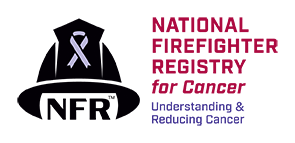What to know
Not sure what the NFR is or why it's important? Read below! If you have questions about the NFR, please contact NFRegistry@cdc.gov.

What is the NFR?
In 2018, Congress passed the Firefighter Cancer Registry Act. This Act directed the National Institute for Occupational Safety and Health (NIOSH) to develop a voluntary registry to better understand the link between firefighting and cancer. The NFR is the largest effort undertaken so far to understand and reduce cancer among U.S. firefighters.
Why was the NFR created?
Studies show that firefighters may have a greater risk of some types of cancer due to their exposure to smoke and hazardous chemicals on the fireground. Many of these studies did not include volunteer firefighters or enough female or non-white firefighters to draw conclusions about their specific cancer risk. The NFR was created to address these knowledge gaps. The NFR will collect information from a large and diverse population of firefighters, with representation from previously understudied groups. Therefore, it will be possible to study cancer risk among different groups of firefighters.
Who can register?
All U.S. firefighters, with or without cancer, no matter their length of service. This includes:
- Active, former, and retired firefighters
- Career, paid-on-call, and volunteer firefighters
- Structural firefighters
- Wildland firefighters
- Industrial firefighters
- Military firefighters
- Instructors
- Fire investigators
- Other fire service members
Participation is voluntary.
Why should I join?
Having many types of firefighters join the NFR is vital to examining the relationship between firefighting and cancer. The more researchers know about cancer, the more that can be done to prevent it.
By joining the NFR, you can:
- Help protect your brothers and sisters in the fire service from developing cancer
- Help lessen the impact of cancer on firefighters' families and friends
- Pave the way for new health and safety measures to keep the next generation of firefighters safe
- Improve understanding of cancer risk among minority, female, and volunteer firefighters, as well as groups like wildland firefighters
If I don't have cancer, can I still join the NFR?
Yes. All firefighters, with or without cancer, are encouraged to join the NFR, and their participation is critical for understanding firefighters’ risk of cancer.
I don't have cancer. Why should I join the NFR?
It is important that both firefighters with and without cancer diagnoses join the NFR. Having both will allow NIOSH scientists to compare those who develop cancer over time to those who do not. This will help us better understand what factors contribute to cancer development in firefighters.
Currently, in the United States, cancer is a reportable illness in all 50 states. However, most states do not collect detailed information about occupation. So, if a firefighter develops cancer in the future, scientists may not know they are a firefighter unless they are enrolled in the NFR. The NFR is way for people to identify themselves as a firefighter and provide details about their work history and other factors. This makes it possible to study the relationship between firefighting and cancer over time. Combining information from firefighters across the U.S. will help researchers better understand cancer and its risk factors in the fire service, which could ultimately help reduce cancer among firefighters for generations to come.
How does the NFR work?
Every time someone is diagnosed with cancer, their healthcare provider submits information about the diagnosis to state cancer registries for public health purposes. However, little information about cancer patients' work history is collected in these state cancer registries. So, a firefighter's cancer diagnosis would be captured by the state cancer registry where they live, but not detailed information about their occupation (or time as a volunteer firefighter).
The NFR will help researchers address this knowledge gap. When you sign up for the NFR, you will be asked to provide your name and other identifying information (e.g., date of birth). This will allow NIOSH researchers to match the information you provided in the NFR to cancer diagnosis information from state cancer registries. This makes it possible to study the relationship between firefighting and cancer outcomes over time. Watch this video to learn more about how the NFR works.
How do I join the NFR?
Visit NFR.CDC.GOV to join. Full registration will take about 30 minutes, but it does not need to be completed all at once. You can log out at any time and pick up where you left off. The initial steps of creating an account, signing a consent form, and completing a user profile can be completed in 5-10 minutes.
When joining the NFR, you will provide some information about yourself – name, date of birth, and some basic information about work exposures and lifestyle. You can find more information about how to sign up in this fact sheet.
What if I don't understand certain terms or how to answer a question while registering?
We understand not all firefighters use the same terminology. We suggest answering questions to the best of your ability, or you can select "N/A". For example:
- When estimating the number of responses throughout your career, you can include vegetation/brush fires and wildland fires. Typically, brush/vegetation fires are shorter in duration, whereas wildland fires are considered more severe in duration and intensity.
- If you believe any of the questions about personal protective equipment do not apply to your work, you can select "N/A".
- For shift configuration, select the option that best describes most of your time at work. If none of the options are suitable, you can select "Other" and describe your shift configuration.
What steps are taken to protect my information?
Privacy and data security are top priorities for the NFR. Firefighters join the NFR through a secure website using multi-factor authentication and firefighter data is stored securely with multiple layers of encryption. Your information will be kept confidential and only accessible to NIOSH researchers. Watch this video to learn more about how NIOSH will protect firefighters' data.
